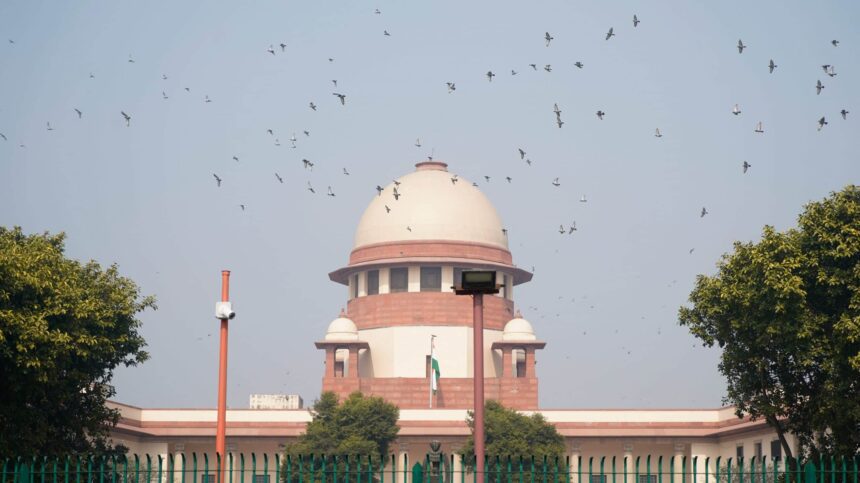The Supreme Court on Friday quashed multiple criminal cases filed against the Vice-Chancellor of Sam Higginbottom University of Agriculture, Technology and Sciences (SHUATS) and other officials, saying criminal law cannot be used as “a tool of harassment” based on “completely incredulous material.”
A bench of Justices J.B. Pardiwala and Manoj Misra set aside five First Information Reports (FIRs) registered in Uttar Pradesh’s Fatehpur district over alleged mass religious conversions to Christianity in April 2022. The court ruled that the cases, registered under various sections of the Indian Penal Code and the Uttar Pradesh Prohibition of Unlawful Conversion of Religion Act, 2021, failed to meet the legal threshold for prosecution.
“Criminal law cannot be allowed to be made a tool of harassment of innocent persons on the basis of completely incredulous material,” the court observed, underscoring that the “rule of law demands fairness, not persecution.”
The case and allegations
The FIRs—filed between April 2022 and January 2023—stemmed from allegations that SHUATS officials and others were involved in converting Hindus to Christianity at the Evangelical Church of India in Fatehpur. One of the earliest complaints, FIR No. 224/2022, was filed by Himanshu Dixit, a Vishwa Hindu Parishad (VHP) leader, alleging that around 90 Hindus were being “forcibly converted” through “fraud and coercion.”
Subsequent FIRs — Nos. 47/2023, 54/2023, 55/2023, and 60/2023 — echoed similar charges. Some complainants claimed they had been promised money, jobs, and marriages if they adopted Christianity. The accused included Vice-Chancellor Rajendra Bihari Lal, other university officials, and local pastors.
The bench found “substantial inconsistencies” and “duplication” in the FIRs, noting that several were “virtual reproductions” of each other. It was observed that the first FIR, lodged by the VHP functionary, was invalid because Section 4 of the unamended UP Conversion Act only permitted an aggrieved person or their immediate family member to file a complaint.
“The complainant in FIR No. 224/2022 was not a person aggrieved within the meaning of Section 4 of the unamended Act,” Justice Pardiwala wrote in the 157-page judgment. “The lodging of such a complaint by a third party is contrary to law.”
Consequently, the subsequent FIRs based on the same incident could not stand. The Court held that allowing such multiple cases would result in “abuse of the process of law.”
The bench further ruled that the mere filing of a chargesheet did not preclude courts from quashing proceedings if the allegations were legally unsustainable.
On Freedom and Fair Process
The judgment emphasised that the right to life and personal liberty under Article 21 of the Constitution includes protection from arbitrary criminal prosecution.
“No person should be forced to undergo the rigours of criminal law merely because of suspicion or public sentiment,” the Court said. “Faith cannot be policed through fear.”
The court also highlighted that mass conversion, though a political flashpoint, is not defined as a separate offence under the UP Conversion Act.
The 2021 Uttar Pradesh law criminalises conversion by force, fraud, or inducement, prescribing up to 10 years in prison. It has been widely criticised by rights groups as a “weaponised” statute used to target minorities, especially Christians and Muslims.
The Fatehpur “conversion” episode, first reported in April 2022, had sparked nationwide attention and multiple arrests. The accused, including SHUATS officials, consistently denied the allegations, calling them “politically motivated.”
By quashing the FIRs, the Supreme Court reaffirmed that procedural safeguards in criminal law cannot be bypassed based on “vague or communal accusations.”
“Faith and belief are matters of conscience,” the Court noted, “and cannot be criminalized unless the statutory preconditions are strictly met.”
The judgment, titled Rajendra Bihari Lal and Another vs. State of Uttar Pradesh and Others (2025 INSC 1249), is likely to influence how lower courts interpret the UP Conversion Act and handle similar complaints in the future.
The post ‘Law can’t be tool to harass people’: Supreme Court quashes 5 FIRs in 2022 Fatehpur conversion case appeared first on Maktoob media.










